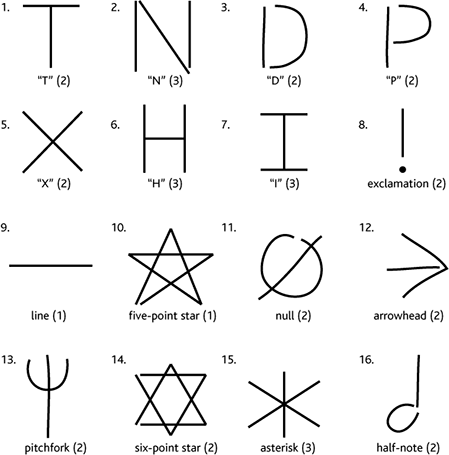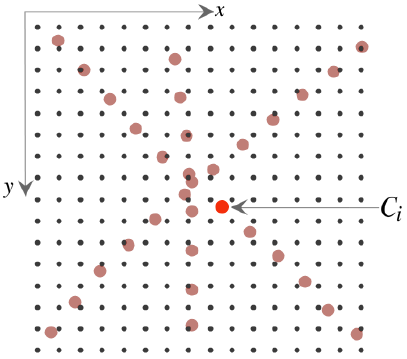Download
$Q source code: JavaScript, C#
Pseudocode: $Q
Multistroke gesture logs: XML
Paper: PDF
This software is distributed under the New BSD License agreement.
About
The $Q Super-Quick Recognizer is a 2-D gesture recognizer designed for rapid prototyping of gesture-based
user interfaces, especially on low-power mobiles and wearables. It builds upon the $P
Point-Cloud Recognizer but optimizes it to achieve a whopping 142× speedup, even while improving
its accuracy slightly. $Q is currently the most performant recognizer in the $-family. Despite
being incredibly fast, it is still fundamentally simple, easy to implement, and requires minimal lines of code.
Like all members of the $-family, $Q is ideal for people wishing to add stroke-gesture recognition to their projects,
now blazing fast even on low-capability devices.
Upon its publication at MobileHCI 2018, $Q
was recognized as an Honorable Mention Paper.
The $-family recognizers have been built into numerous projects and even industry prototypes,
and have had many follow-ons by others. Read about the $-family's impact.
Demo
In the demo below, only one point-cloud template is loaded for each of the 16 gesture types. You can add additional
templates as you wish, and even define your own custom gesture templates.

|
|
Our Gesture Software Projects
- $Q: Super-quick multistroke recognizer - optimized for low-power mobiles and wearables
- $P+: Point-cloud multistroke recognizer - optimized for people with low vision
- $P: Point-cloud multistroke recognizer - for recognizing multistroke gestures as point-clouds
- $N: Multistroke recognizer - for recognizing simple multistroke gestures
- $1: Unistroke recognizer - for recognizing unistroke gestures
- AGATe: AGreement Analysis Toolkit - for calculating agreement in gesture-elicitation studies
- GHoST: Gesture HeatmapS Toolkit - for visualizing variation in gesture articulation
- GREAT: Gesture RElative Accuracy Toolkit - for measuring variation in gesture articulation
- GECKo: GEsture Clustering toolKit - for clustering gestures and calculating agreement
Our Gesture Publications
-
Vatavu, R.-D. and Wobbrock, J.O. (2022).
Clarifying agreement calculations and analysis for end-user elicitation studies.
ACM Transactions on Computer-Human Interaction 29 (1). Article No. 5.
-
Vatavu, R.-D., Anthony, L. and Wobbrock, J.O. (2018).
$Q: A super-quick, articulation-invariant stroke-gesture recognizer for low-resource devices.
Proceedings of the ACM Conference on Human-Computer Interaction with Mobile Devices and Services (MobileHCI '18).
Barcelona, Spain (September 3-6, 2018).
New York: ACM Press. Article No. 23.
-
Vatavu, R.-D. (2017).
Improving gesture recognition accuracy on touch screens for users with low vision.
Proceedings of the ACM Conference on Human Factors in Computing Systems (CHI '17).
Denver, Colorado (May 6-11, 2017).
New York: ACM Press, pp. 4667-4679.
-
Vatavu, R.-D. and Wobbrock, J.O. (2016).
Between-subjects elicitation studies: Formalization and tool support.
Proceedings of the ACM Conference on Human Factors in Computing Systems (CHI '16).
San Jose, California (May 7-12, 2016).
New York: ACM Press, pp. 3390-3402.
-
Vatavu, R.-D. and Wobbrock, J.O. (2015).
Formalizing agreement analysis for elicitation studies: New measures, significance test, and toolkit.
Proceedings of the ACM Conference on Human Factors in Computing Systems (CHI '15).
Seoul, Korea (April 18-23, 2015).
New York: ACM Press, pp. 1325-1334.
-
Vatavu, R.-D., Anthony, L. and Wobbrock, J.O. (2014).
Gesture heatmaps: Understanding gesture performance with colorful visualizations.
Proceedings of the ACM International Conference on Multimodal Interfaces (ICMI '14).
Istanbul, Turkey (November 12-16, 2014).
New York: ACM Press, pp. 172-179.
-
Vatavu, R.-D., Anthony, L. and Wobbrock, J.O. (2013).
Relative accuracy measures for stroke gestures.
Proceedings of the ACM International Conference on Multimodal Interfaces (ICMI '13).
Sydney, Australia (December 9-13, 2013).
New York: ACM Press, pp. 279-286.
-
Anthony, L., Vatavu, R.-D. and Wobbrock, J.O. (2013).
Understanding the consistency of users' pen and finger stroke gesture articulation.
Proceedings of Graphics Interface (GI '13).
Regina, Saskatchewan (May 29-31, 2013).
Toronto, Ontario: Canadian Information Processing Society, pp. 87-94.
-
Vatavu, R.-D., Anthony, L. and Wobbrock, J.O. (2012).
Gestures as point clouds: A $P recognizer for user interface prototypes.
Proceedings of the ACM International Conference on Multimodal Interfaces (ICMI '12).
Santa Monica, California (October 22-26, 2012).
New York: ACM Press, pp. 273-280.
-
Anthony, L. and Wobbrock, J.O. (2012).
$N-Protractor: A fast and accurate multistroke recognizer.
Proceedings of Graphics Interface (GI '12).
Toronto, Ontario (May 28-30, 2012).
Toronto, Ontario: Canadian Information Processing Society, pp. 117-120.
-
Anthony, L. and Wobbrock, J.O. (2010).
A lightweight multistroke recognizer for user interface prototypes.
Proceedings of Graphics Interface (GI '10).
Ottawa, Ontario (May 31-June 2, 2010).
Toronto, Ontario: Canadian Information Processing Society, pp. 245-252.
-
Wobbrock, J.O., Wilson, A.D. and Li, Y. (2007).
Gestures without libraries, toolkits or training: A $1 recognizer for user interface prototypes.
Proceedings of the ACM Symposium on User Interface Software and Technology (UIST '07).
Newport, Rhode Island (October 7-10, 2007).
New York: ACM Press, pp. 159-168.
Copyright © 2019-2022 Jacob O. Wobbrock. All rights reserved.
Last updated August 8, 2022.


